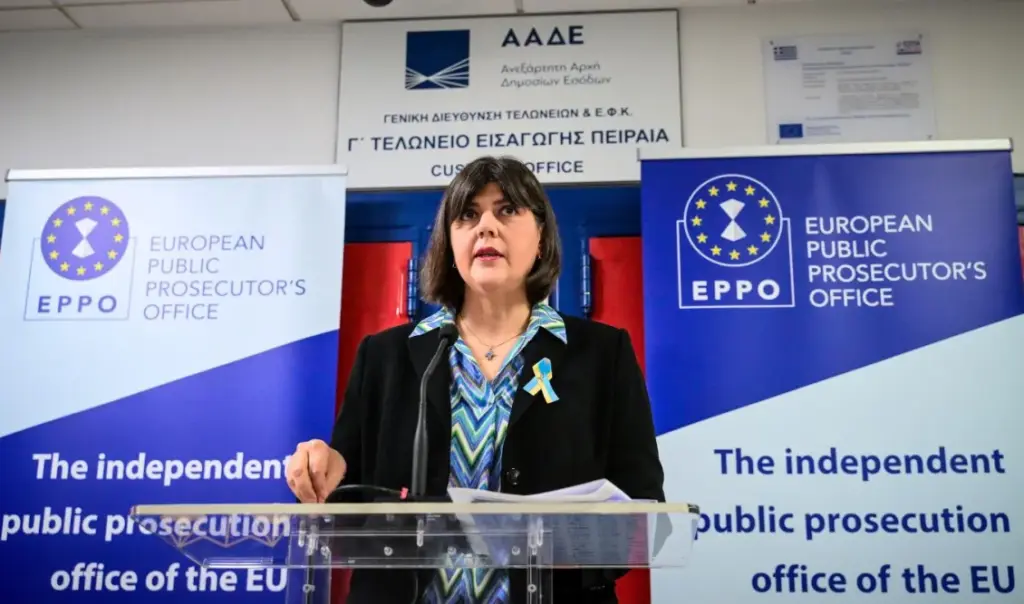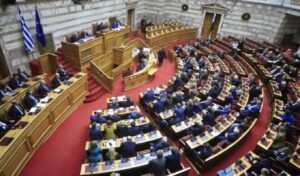Significant developments are expected following the visit of European Chief Prosecutor, Laura Codruța Kövesi, to Athens this week, who held important meetings with government officials and Supreme Court Prosecutor Konstantinos Tzavellas, against the backdrop of several major cases under investigation by the Greek office of the European Public Prosecutor’s Office.
Laura Codruța Kövesi in Athens: Key meetings and Article 86
Ms. Kövesi held significant meetings with government officials and raised a series of important issues concerning prosecutorial authorities, but most importantly, she officially put on the table the need to revise Article 86 of the Constitution, which concerns the criminal liability of ministers. The European Chief Prosecutor had raised this issue in the past, particularly when the European Public Prosecutor’s Office handled the case of contract 717 for railway network security. “The bad news is that, as with the Tempe case, this criminal investigation could not be fully developed due to the Greek Constitution. The good news is that Parliament can modify Article 86 of the Constitution. I understand that there is now sufficient political will to start this process. The sooner, the better,” Ms. Kövesi stated at the press conference she gave at Piraeus Customs.
Enhanced cooperation between Greece & European Public Prosecutor’s Office against financial crimes
The fact that one of the main issues that occupied the European Prosecutor concerned the criminal liability of ministers was also confirmed by the Ministry of Justice, noting in its relevant announcement that Justice Minister Giorgos Floridis informed her that Prime Minister Kyriakos Mitsotakis has already announced a proposal to revise it.
Another important issue that Ms. Kövesi reportedly showed particular interest in, especially during her meeting with Finance Minister Kyriakos Pierrakakis and Mr. Floridis, concerned the close cooperation that the European Public Prosecutor’s Office seeks with state audit mechanisms to combat financial crimes, such as the major customs fraud that was dismantled months ago, known as operation “Kalypso.” Due to this operation, Ms. Kövesi’s press conference was held at Piraeus Customs.
Increase of European prosecutors at the center of Kövesi’s visit
The European Chief Prosecutor also had another important objective in coming to Athens. That of more effective operation of the Office of European Delegated Prosecutors in Greece. In this context, she requested that the positions of Greek European prosecutors be increased by three, from 10 to 13, and that there be an increase of six in the scientific staff supporting their work. Another crucial issue for Ms. Kövesi, which was reportedly raised in her meeting with Supreme Court Prosecutor Konstantinos Tzavellas, concerned the extension of tenure for some European prosecutors. The prosecutorial officers staffing this service are selected by the Supreme Judicial Council. According to sources, Ms. Kövesi told the Supreme Court Prosecutor that she intends to renew their tenure, expressing the view that she has the power to do so unilaterally.
Laura Codruța Kövesi: European Public Prosecutor’s Office independence in Greece is non-negotiable
In any case, everything indicates that investigations conducted by the European Public Prosecutor’s Office will continue to occupy current affairs in the coming period, with Ms. Kövesi asserting that the independence of the service she heads is non-negotiable.
Regarding her meeting with Citizen Protection Minister Michalis Chrysochoidis, which took place in an excellent atmosphere, this represents among other things the culmination of the communication channel and very good cooperation between the authorities and the European Public Prosecutor’s Office. In recent months, relevant police authorities have turned to the office of delegated European prosecutors for many cases, with the most recent being the case of fictitious invoices and illegal VAT refunds.
According to sources, just at the end of last September, the competent Economic Crime Investigation Subdivision received valuable assistance from the European Public Prosecutor’s Office, when it responded immediately and positively to the service’s request to utilize crucial evidence, such as digital evidence from lifting communication secrecy, concerning defendants in the recent case, in which even a well-known presenter and producer was found to be a defendant.
Correspondingly, cooperation moves in both directions, as the Hellenic Police declares itself always present and ready to execute any assignment from the Greek office of European Delegated Prosecutors. Certainly, Laura Codruța Kövesi’s reference to the European Public Prosecutor’s Office – Europol – Hellenic Police triangle is not accidental, as cooperation relations with the European Police Service have been progressively closer for at least the last two years.
Critical Kövesi meetings for strengthening investigations and customs upgrade
In a similar atmosphere of very good cooperation was the meeting at the central offices of the largest audit authority, AADE, between Laura Codruța Kövesi and the political leadership of the Finance Ministry. For over an hour, the European Prosecutor and her associates spoke with both Finance Minister Kyriakos Pierrakakis and AADE Governor Giorgos Pitsilis, in the presence of Deputy Minister Giorgos Kotsiras.
The Greek side presented for the first time the four-year plan for customs modernization. According to both sides, the meeting was extremely productive, something that Ms. Kövesi herself acknowledged, as agreement was recorded on the issues discussed, including close cooperation between the Finance Ministry, AADE and European Public Prosecutor’s Office in terms of information sharing and supporting the European Public Prosecutor’s Office branch with additional human resources.
Published in Parapolitika 4.10




